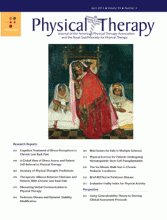Abstract
Background Communication in clinical encounters is vital in ensuring a positive experience and outcome for both patient and clinician.
Objective The purpose of this study was to measure verbal communication between physical therapists and patients with back pain during their initial consultation and trial management of the data using a novel, Web-based application.
Design A cross-sectional study was conducted.
Methods Nine musculoskeletal physical therapists and 27 patients with back pain participated in this study. Twenty-five initial consultations were observed, audio recorded, and categorized using the Medical Communications Behavior System. Data were managed using Synote, a freely available application enabling synchronization of audio recordings with transcripts and coded notes.
Results In this sample, physical therapists spoke for 49.5% of the encounter and patients for 33.1%. Providers and patients spent little time overtly discussing emotions (1.4% and 0.9%, respectively). More-experienced clinicians used more “history/background probes,” more “advice/suggestion,” and less “restatement” than less-experienced staff, although they demonstrated a greater prevalence of talking concurrently and interrupting patients (7.6% compared with 2.6%).
Limitations Although studies measuring actual behavior are considered to be the gold standard, audio recordings do not enable nonverbal behaviors to be recorded.
Conclusion This study investigated a method for measuring the verbal content of clinical encounters in a physical therapy outpatient setting. The study has directly contributed to developing a research-friendly version of the application (ie, Synote Researcher). Given the pivotal role of communication in ensuring a positive experience and outcome for both patient and provider, investing time in further developing communication skills should be an on-going priority for providers. Further work is needed to explore affective behaviors and the prevalence of interrupting patients, considering differences in sex and provider experience.
Footnotes
Dr Roberts, Dr Cleland, and Dr Wald provided concept/idea/research design and writing. Dr Roberts provided data collection, project management, and fund procurement. Mr Whittle provided data analysis. Dr Wald provided facilities/equipment and consultation (including review of manuscript before submission). The authors acknowledge the patients and staff in the Southampton City Primary Care Trust, members of the steering committee (Professor Paul Little, Professor Maria Stokes, Professor Cyrus Cooper, Dr Rose Wiles, and Mr Mark Mullee), and Dr Paul Roberts (technical support).
This work was conducted within the Southampton Musculoskeletal Biomedical Research Unit.
Ethical approval for this study was granted by the Southampton and South West Local Research Ethics Committee, United Kingdom (08/H0502/15).
The authors acknowledge the following sources of funding: Arthritis Research UK for funding the fellowship of Dr Roberts, Wessex Medical Trust for funding the Student Innovation Grant for Mr Whittle, and the Joint Information Systems Committee for the recent development of Synote Researcher.
- Received March 4, 2012.
- Accepted November 19, 2012.












